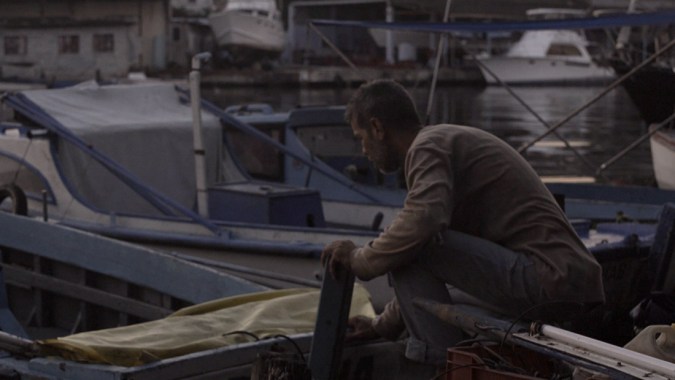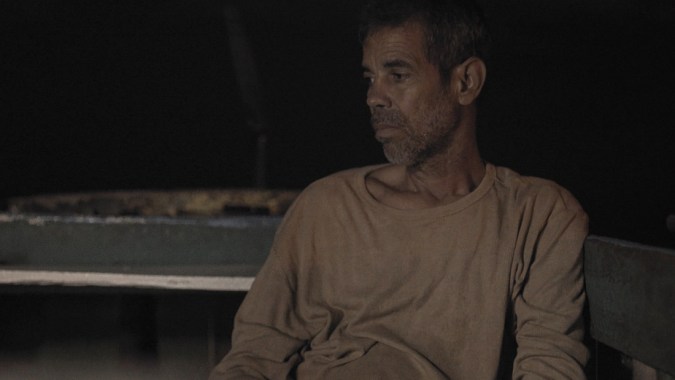A parent’s sacrifices often happen off-screen. At least in their children’s eyes. Whether it’s putting food on the table or finally getting enough money to get you the dress you really wanted, their trials and tribulations are kept outside of the purview of young kids. In Ana A. Alpizar’s short film El pescador (The Fisherman), we see one such sacrifice. While a young Cuban girl practices the singing and dancing routine she’s set to perform later that week, her father sets out to sea to nab a fish he’ll need to sell if he’s to get the money the cash-strapped family needs to afford the dress she’ll wear.
Taking place mostly at night, while the eponymous protagonist (Carlos Vigón) tries to catch something — anything! — this quiet portrait of a doting father is intimate and unassuming. But with its opening long shot introducing the family dynamics at work in this Cuban household (daughter singing, mother kneading dough, father getting ready), the short achieves a cinema verité aspect. It dispenses with a score, and even dialogue for much of it, letting you take in the sounds of a lonely fishing boat in the middle of the night.
The Fisherman screened at this month’s Sundance Film Festival, and we got a chance to chat with Alpizar ahead of her trip to Park City. In Cuba, she remarked, filmmakers tend to be rather removed from the hustle and bustle of film festivals like Sundance, so she was giddily looking forward to seeing the nuts and bolts of the American film industry up close and personal. Talking about her career and her process, the Cuban-born filmmaker told us about the personal inspiration behind this short, why certain restrictions made the shoot quite challenging, and how the Cuban independent cinema scene has changed in the last few years.
The Fisherman screens as part of the Shorts Program 3 at this year’s Sundance Film Festival
Tell us a bit about your background; when did you first began to be interested in filmmaking?
I started very early, when I was 18. As soon as I got out of high school, [I] went straight to study film in the Institute in Cuba. I have a very academic background. I started studying Audio Visual Communication in the Institute in Havana and the Screenwriting in the Escuela Internacional de Cine de San Antonio de los Baños. So everything that I’ve done for the most part have been class exercises or school projects. Actually, this was my first film that I produced independently. Because, since I’m only studying screenwriting, there was no room or opportunity in my curriculum to take on directing duties. And that’s really what interests me. So it’s a short film produced independently, which in Cuba is quite hard to do.
Where did the idea for The Fisherman come from?
Well, my dad is a fisherman. This is a story that’s very much about us. I grew up in that world, very close to it. But, as a girl, I despised it. I truly hated that whole fishing world. So this was a way to give my father a kind of gift because he sacrificed so much for us. In fact, he’s an economist but in the 90s things were so difficult here in Cuba that professionals everywhere had to find other sources of income. When I was little, I hated this. I hated that my father was a fisherman. But he gave up his life to raise me.

You mentioned producing independently in Cuba is a hard to do; can you explain why that is and how you got around that to shoot this short?
Well, the short was financed by money coming from foreign — actually European — embassies. That’s what is mostly financing independent cinema in Cuba right now. The Netherlands embassy gave us some money. A contest called GO CUBA!, it’s a very famous contest. Then, there’s a fund set up at the Norway embassy which also gave us some financing. And there was also some money from a fund for young Cuban filmmakers. The thing is, as an independent producer, you don’t really exist at the legal level. You’re not accredited that way. So putting up and setting up a production as an independent producer is very difficult. In this case even more because you’re not really allowed to shoot out at sea. They don’t. We had to shoot those scenes with a reduced crew: I did it without a sound crew. It was just the actor, who’s actually a real-life fisherman, the cameraman and then just me. I had to do the sound work because we couldn’t bring anyone else with us out to sea. Moreover, the cameraman is Puerto Rican and they wouldn’t allow him to come on board with us because there’s a law here in Cuba that says no Cuban national can board a sea vessel with a foreign national. It’s a really absurd law, honestly. So it was basically shooting “al pecho,” as we say. It was very risky and it was very tricky to get it all set up.
It was all very strange because we had to change to script quite a bit. The entire shooting plan we had we had to scrap it when we had to keep all of these things in mind. We ended up shooting what amounts to a documentary at the end of the day. The whole fishing sequence was pretty much that. Because we didn’t have any other tools or equipment to shoot anything else. I ended up liking that, though. I enjoyed learning to work like that.

It strikes me that there really is a new wave of independent filmmakers in Cuba right now and I was curious as to whether it feels like that to you, since you’re on the ground, as it were.
I think there has been an unavoidable change, especially given the technological revolution we’ve been seeing. We’ve seen that have a democratizing effect when it comes to who has access to what kind of equipment. That’s led, in Cuba, to an independent film movement that is, in my opinion, quite strong. And that it’s producing some of the best work being done here in the island. But what is happening still is that the Cuban government still won’t recognize them; they won’t play their movies. They have no legal standing. You, as an independent producer, don’t exist. You can’t apply to any kind of grants or funds. These Dutch funds—you actually have to apply to them as an individual, not as a film producer. You can’t apply to these bigger funds unless you partner up with a foreign producer or set up a production company outside of Cuba. In Cuba, there’s a big push because there’s a Ley de Cine and all filmmakers, independent or not, are under that but the government isn’t really adhering to it. And in that sense, Cuban independent cinema is wholly excluded, which is very sad. Because what happens is that a lot of talented people just end up leaving.
Speaking of that, I wanted to hear you talk a bit about your production company, fila20.
Okay, so fila20 was founded by a group of friends who grew up in Cuba. And then, funnily enough, we all ended up living abroad, in the US. We’re committed to telling Latino stories here in the United States. I’m the one who has, perhaps, the strongest bond with Cuba. I’m very interested in shooting there, still. We’re here just getting started. We have a dozen short films that have been shown around the world. Right now we’re focused on getting our first feature length film up and running. We’re working on a story that would be told completely from a smartphone screen. I think that would be very interesting. As for myself, I’m also working on a feature film which would be part of The Fisherman and would involve the daughter character. But it’s all very early and it’s all still just up in the air. So that’s what we’re working on.
This interview was conducted in Spanish and was translated for Remezcla by the author.




